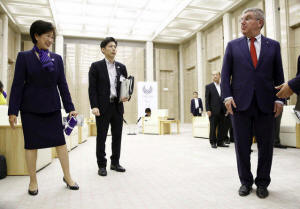|
IOC
concerned about Tokyo 2020 costs, will work to help pare
 Send a link to a friend
Send a link to a friend
 [October 18, 2016]
By Elaine Lies and Chris Gallagher [October 18, 2016]
By Elaine Lies and Chris Gallagher
TOKYO (Reuters) - The International
Olympic Committee (IOC) said on Tuesday that it felt costs for the
2020 Tokyo Games looked "very high" and would work with organizers
to cut them, but that athletes must come first when considering how
to rein in spending.
The comments came at a meeting between Tokyo Governor Yuriko Koike
and IOC President Thomas Bach, who proposed forming a working group
comprising Tokyo, the central government, 2020 organizers and the
IOC to find ways to avoid wasteful spending.
Koike, who took office in August, ordered a review of Olympic
expenses that last month recommended changing three venues in an
effort to rein in costs projected to hit 3 trillion yen ($29
billion) -- some four times the initial estimates made when Tokyo
won the right to host the Games.
"That's certainly a figure that seems very large to us," IOC Vice
President John Coates told reporters after the meeting, adding that
he was confident those figures could be reduced.
One of the proposed venue changes would mean moving rowing and
canoe/kayak sprint events some 400 km (250 miles) north of Tokyo to
use existing facilities rather than building new ones in the
capital.

The IOC, the 2020 Organising Committee and international rowing
federation favor the original plan to keep the venue in Tokyo, while
Koike last week told Reuters this was the last chance to take steps
to rein in soaring costs.
Bach did not comment directly on the proposed venue changes but
emphasized that the experience of the athletes should be the
priority in planning for the Games.
"The athletes are the heart and soul of the Olympic Games and we
have to respect them," Bach said.
If they fail to reach an agreement on the Tokyo site, known as the
Sea Forest Waterway, the IOC would even consider hosting the events
in the South Korean city of Chungju, where rowing events were held
for the 2014 Asian Games, Japanese media reports said earlier on
Tuesday.
[to top of second column] |

IOC President Thomas Bach (R) meets Tokyo Governor Yuriko Koike at
Tokyo Metropolitan Government Building in Tokyo, Japan, October 18,
2016. REUTERS/Kim Kyung-Hoon

Reforms known as "Agenda 2020", carried out under Bach with the aim
of making the Olympics more sustainable, allow hosts to use
facilities in other cities or even countries if it makes financial
and practical sense.
Koike said she was still reviewing the proposed venue changes and
would make a decision by the end of the month, after which she
suggested holding the first meeting of the four-party working group.
Tokyo's original bid pledged to keep most venues within 8 km of the
athlete's village in downtown Tokyo, but several have already been
moved. Cycling will take place in Shizuoka prefecture, about 200 km
(125 miles) west of Tokyo.
Tokyo organizers have been grappling with a series of setbacks.
They were forced to scrap an initial design for the centerpiece
National Stadium, site of the opening and closing ceremonies,
because it was too expensive, and had to redesign the logo for the
Games following accusations of plagiarism.
($1 = 102.9000 yen)
(Reporting by Elaine Lies and Chris G
[© 2016 Thomson Reuters. All rights
reserved.] Copyright 2016 Reuters. All rights reserved. This material may not be published,
broadcast, rewritten or redistributed.
 |